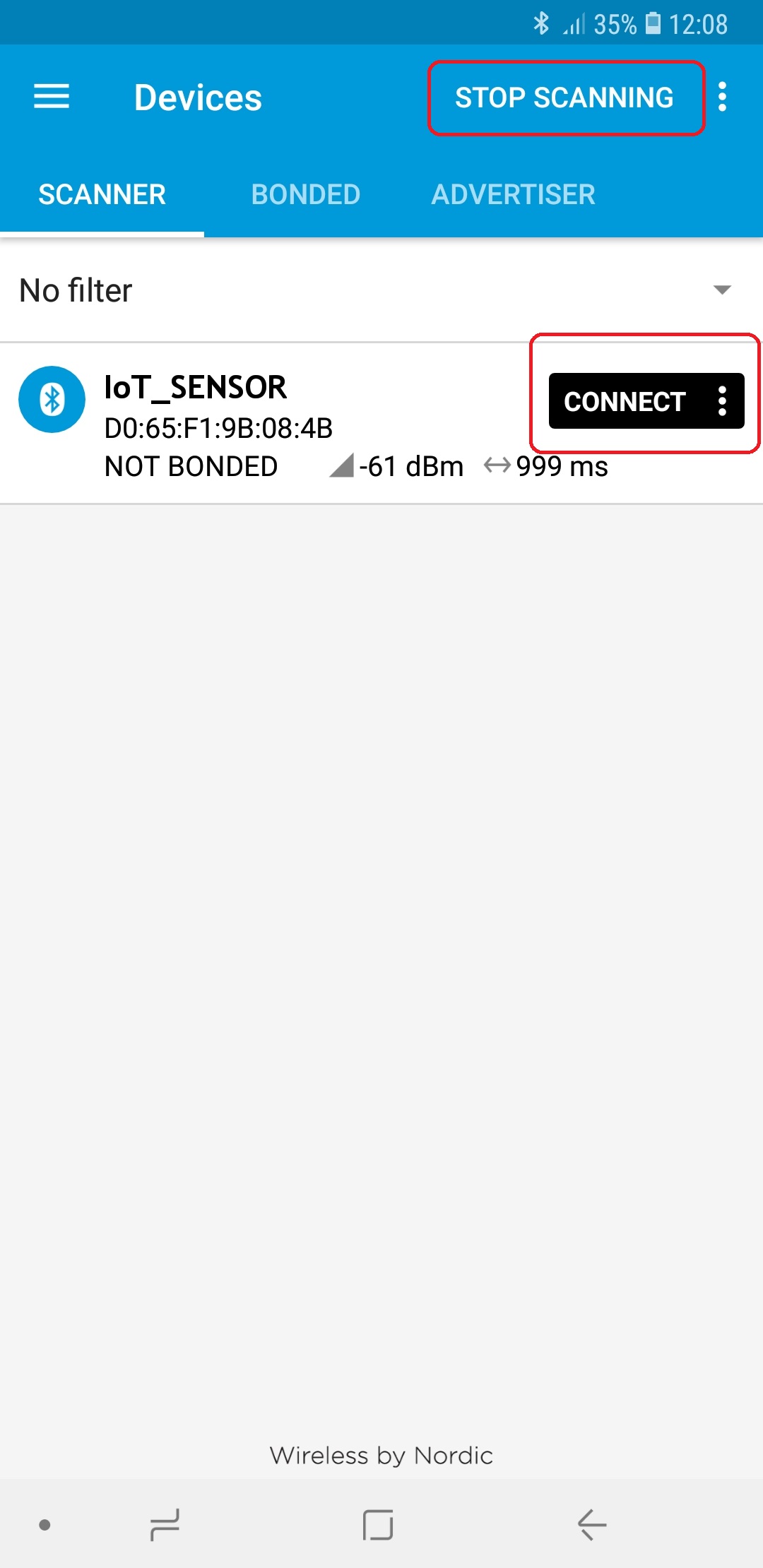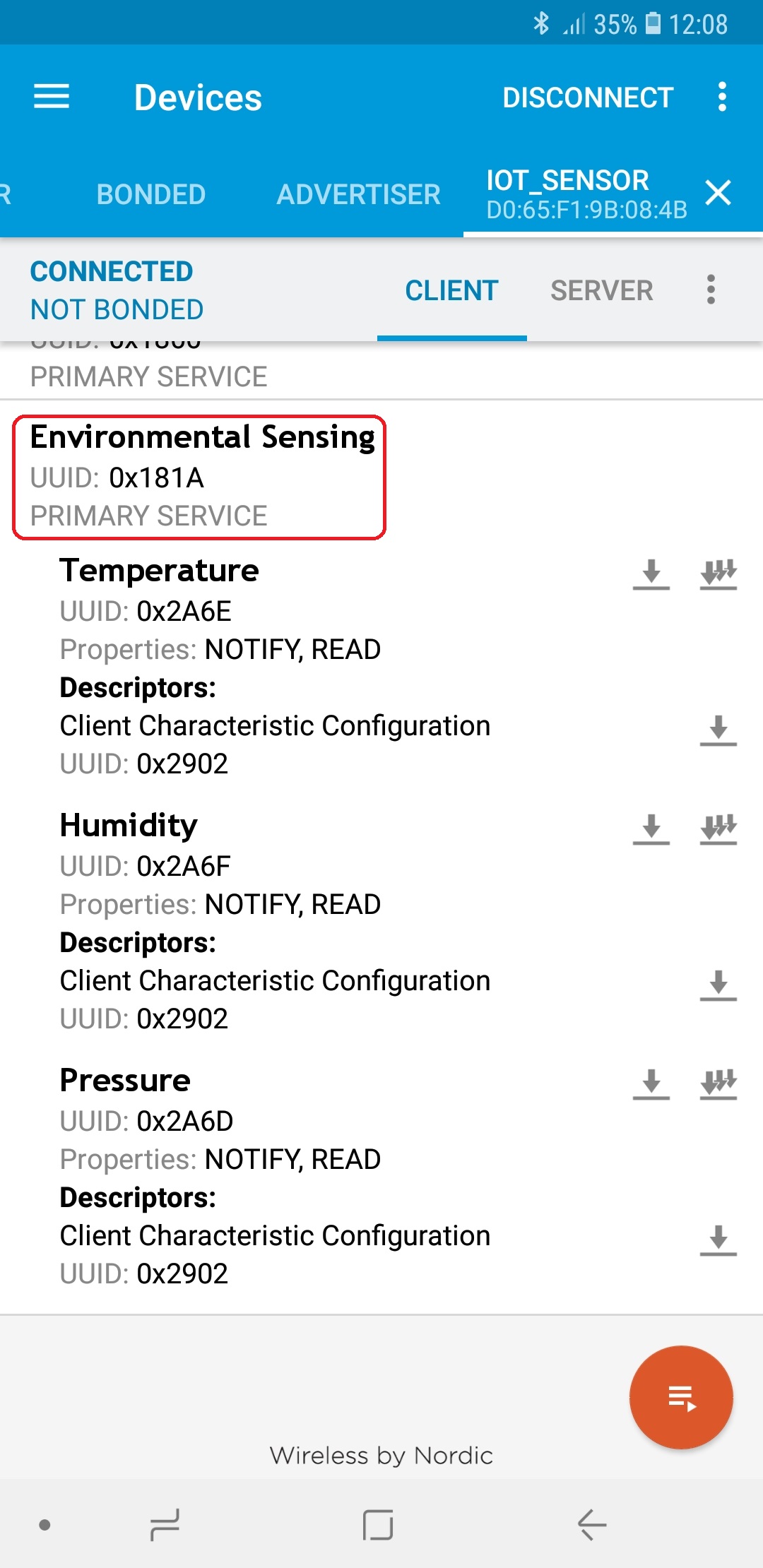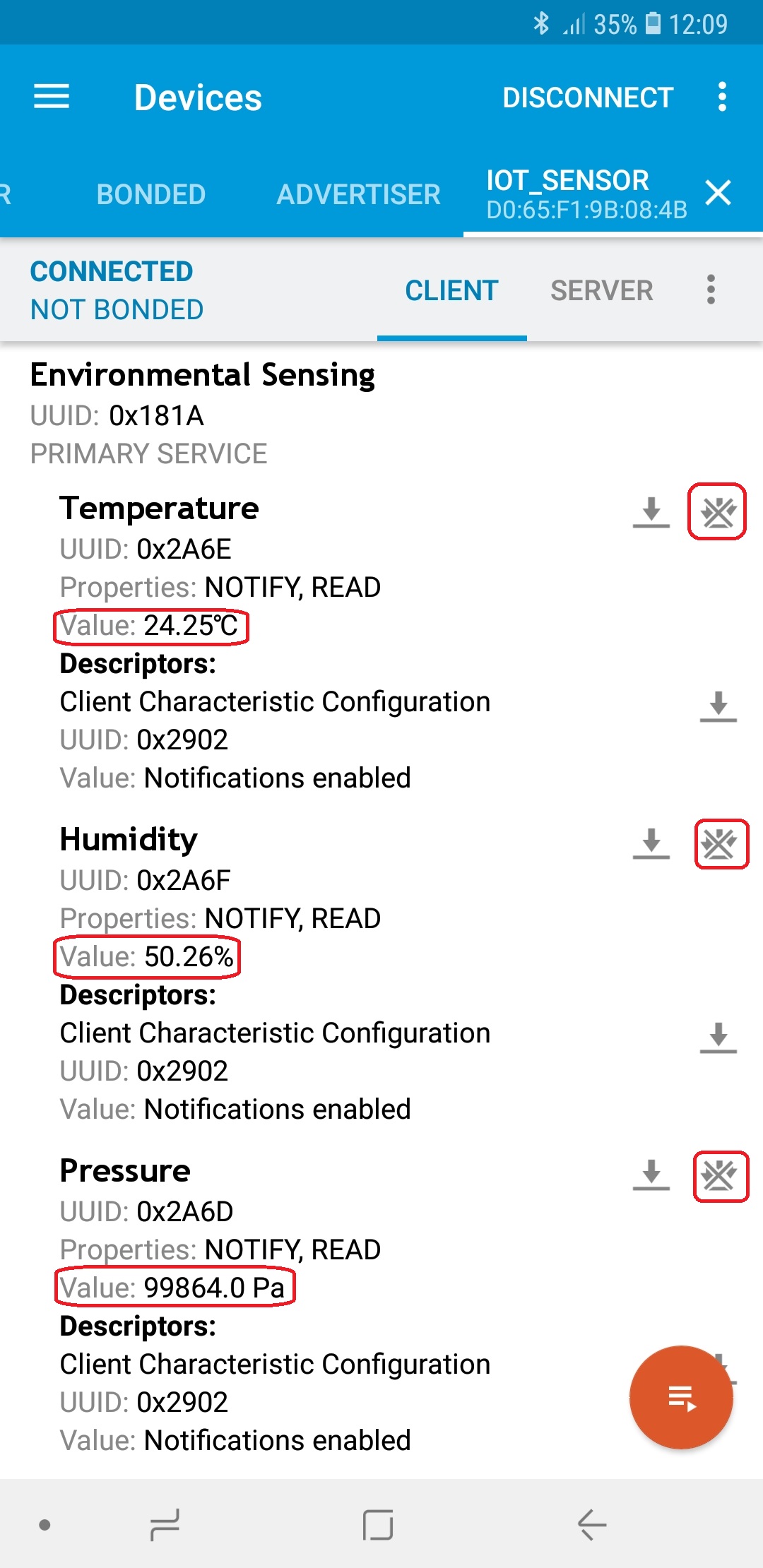BLE example with Environmental Sensing service.
Dependencies: BSP_B-L475E-IOT01
Hello IoT BLE
This project uses Environmental Sensing Service and its characteristics:
Characteristic values can be read or they might be observed with notifications enabled.
Please note that this example uses slightly modified Environmental service.
Also there have been some opened issues regarding value types Issue 1 and Issue 2.
Note that this application was developed as a part of a larger project Hello IoT, but can be used as a standalone.
(Source files can be found at the end of this page.)
Running the application
The sample application can be seen on any BLE scanner on a smartphone. If you don't have a scanner on your phone, please install:
- nRF Master Control Panel for Android.
- LightBlue for iPhone
Hardware requirements are in the main readme.
Building instructions
Building with mbed CLI
If you'd like to use mbed CLI to build this, then you should refer to the main readme. The instructions here relate to using the Mbed Online Compiler.
Building with Mbed Online Compiler
In order to build this example in the Mbed Online Compiler, first import the example using the Import button on the right hand side.
Next, select a platform to build for. This must either be a platform that supports BLE, for example the NRF51-DK, or one of the following:
List of platforms supporting Bluetooth Low Energy.
Or you must also add a piece of hardware and the supporting library that includes a Bluetooth Low Energy driver for that hardware, for example the K64F or NUCLEO_F401RE with the X-NUCLEO-IDB05A1
List of components supporting Bluetooth Low Energy.
Once you have selected your platform, compile the example and drag and drop the resulting binary onto your board.
Note: This example was tested with DISCO_L475VG_IOT01A (ref B-L475E-IOT01A), so when using onboard sensors instead of simulated ones, make sure you select this board.
For general instructions on using the Mbed Online Compiler, please see the mbed Handbook.
Checking for success
Note: Screen captures depicted below show what is expected from this example if the scanner used is nRF Connect. If you encounter any difficulties consider trying another scanner or another version of nRF Connect. Alternative scanners may require reference to their manuals.
- Build the application and install it on your board as explained in the building instructions.
- Open the BLE scanner on your phone.
- Start a scan and connect to a device named IoT_SENSOR.

- Discover the services and the characteristics on the device. The Environmental Sensing service has the UUID
0x181Awith characteristics Temperature0x2A6E, Humidity0x2A6Fand Pressure0x2A6D.

- At this point you can read or register for notifications. In figure below, all characteristics have been registered for notification and their values should change every second.

source/main.cpp
- Committer:
- jernej_vrscaj
- Date:
- 2018-12-29
- Revision:
- 0:0681ebb27b3c
File content as of revision 0:0681ebb27b3c:
/* mbed Microcontroller Library
* Copyright (c) 2006-2013 ARM Limited
*
* Licensed under the Apache License, Version 2.0 (the "License");
* you may not use this file except in compliance with the License.
* You may obtain a copy of the License at
*
* http://www.apache.org/licenses/LICENSE-2.0
*
* Unless required by applicable law or agreed to in writing, software
* distributed under the License is distributed on an "AS IS" BASIS,
* WITHOUT WARRANTIES OR CONDITIONS OF ANY KIND, either express or implied.
* See the License for the specific language governing permissions and
* limitations under the License.
*/
#include <events/mbed_events.h>
#include "mbed.h"
#include "ble/BLE.h"
#include "EnvironmentalService_v2.h"
//#include "debug.h"
// Uncomment this line if you want to use the board temperature sensor instead of
// a simulated one.
#define USE_BOARD_SENSORS
#ifdef USE_BOARD_SENSORS
#include "stm32l475e_iot01_tsensor.h"
#include "stm32l475e_iot01_hsensor.h"
#include "stm32l475e_iot01_psensor.h"
#endif
#define ADVERTISING_INTERVAL 1000
#define UPDATE_VALUES_INTERVAL 1000
DigitalOut led1(LED1, 0);
DigitalOut led2(LED2, 0);
const static char DEVICE_NAME[] = "IoT_SENSOR";
static const uint16_t uuid16_list[] = {GattService::UUID_ENVIRONMENTAL_SERVICE};
static EnvironmentalService *environmentServicePtr;
/* initial dummy values */
static float currentTemperature = -15.0;
static float currentHumidity = 0.0;
static float currentPressure = 260.0 * 100; // hPa -> Pascal
static EventQueue eventQueue(/* event count */ 16 * EVENTS_EVENT_SIZE);
static int id_adv;
static int id_conn;
void updateSensorValue(void) {
static int16_t lastTemperature;
static uint16_t lastHumidity;
static uint32_t lastPressure;
int16_t tempTemperature = 0;
uint16_t tempHumidity = 0;
uint32_t tempPressure = 0;
#ifdef USE_BOARD_SENSORS
currentTemperature = BSP_TSENSOR_ReadTemp();
currentHumidity = BSP_HSENSOR_ReadHumidity();
currentPressure = BSP_PSENSOR_ReadPressure();
currentPressure = currentPressure*100; // hPa -> Pascal
#else
/* dummy values */
currentTemperature = (currentTemperature + 0.1f > 43.0f) ? -15.0f : currentTemperature + 0.1f;
currentHumidity = (currentHumidity + 0.1f > 100.0f) ? 0.0f : currentHumidity + 0.1f;
currentPressure = (currentPressure + 10 > 126000.0f) ? 26000.0f : currentPressure + 10;
#endif
#ifdef DEBUG
pc.printf("\r\n");
pc.printf("T_sensor = %.2f C\r\n", ((int16_t)(currentTemperature*100))/100.0);
pc.printf("H_sensor = %.2f %%\r\n", ((uint16_t)(currentHumidity*100))/100.0);
pc.printf("P_sensor = %.1f Pa\r\n", ((uint32_t)(currentPressure*10))/10.0);
pc.printf("\r\n");
#endif
tempTemperature = (int16_t)(currentTemperature*100);
tempHumidity = (uint16_t)(currentHumidity*100);
tempPressure = (uint32_t)(currentPressure*10);
/* Update char values, but only if they differ from previous */
if(tempTemperature != lastTemperature)
{
environmentServicePtr->updateTemperature(tempTemperature);
lastTemperature = tempTemperature;
}
if(tempHumidity != lastHumidity)
{
environmentServicePtr->updateHumidity(tempHumidity);
lastHumidity = tempHumidity;
}
if(tempPressure != lastPressure)
{
environmentServicePtr->updatePressure(tempPressure);
lastPressure = tempPressure;
}
}
void periodicCallback(void)
{
/* Do blinky on LED1 while advertising */
led1 = !led1;
wait(0.25);
led1 = !led1;
}
/* On Connection event start updating sensor values */
void connectionCallback(const Gap::ConnectionCallbackParams_t *)
{
#ifdef DEBUG
pc.printf("\r\n");
pc.printf("Connection Event.\r\n");
#endif
eventQueue.cancel(id_adv);
led1 = 0;
led2 = 1; // LED2 on when connected
updateSensorValue();
id_conn = eventQueue.call_every(UPDATE_VALUES_INTERVAL, updateSensorValue);
}
/* Restart Advertising on disconnection*/
void disconnectionCallback(const Gap::DisconnectionCallbackParams_t *)
{
eventQueue.cancel(id_conn);
led2 = 0; // LED2 off when disconnected
BLE::Instance().gap().startAdvertising();
id_adv = eventQueue.call_every(ADVERTISING_INTERVAL, periodicCallback);
#ifdef DEBUG
pc.printf("\r\n");
pc.printf("Disconnection Event - Start Advertising...\r\n");
#endif
}
void onBleInitError(BLE &ble, ble_error_t error)
{
/* Initialization error handling should go here */
#ifdef DEBUG
pc.printf("BLE Init Error: %u\r\n", error);
#endif
while(1)
{ /* Do blinky on LED2 on Error */
led2 = !led2;
wait(0.25);
}
}
void bleInitComplete(BLE::InitializationCompleteCallbackContext *params)
{
BLE& ble = params->ble;
ble_error_t error = params->error;
if (error != BLE_ERROR_NONE) {
onBleInitError(ble, error);
return;
}
/* Ensure that it is the default instance of BLE */
if (ble.getInstanceID() != BLE::DEFAULT_INSTANCE) {
return;
}
/* Callback function when connected */
ble.gap().onConnection(connectionCallback);
/* Callback function when disconnected */
ble.gap().onDisconnection(disconnectionCallback);
/* Setup primary service. */
environmentServicePtr = new EnvironmentalService(ble);
/* setup advertising */
ble.gap().accumulateAdvertisingPayload(GapAdvertisingData::BREDR_NOT_SUPPORTED | GapAdvertisingData::LE_GENERAL_DISCOVERABLE);
ble.gap().accumulateAdvertisingPayload(GapAdvertisingData::COMPLETE_LIST_16BIT_SERVICE_IDS, (uint8_t *)uuid16_list, sizeof(uuid16_list));
ble.gap().accumulateAdvertisingPayload(GapAdvertisingData::COMPLETE_LOCAL_NAME, (uint8_t *)DEVICE_NAME, sizeof(DEVICE_NAME));
ble.gap().setAdvertisingType(GapAdvertisingParams::ADV_CONNECTABLE_UNDIRECTED);
ble.gap().setAdvertisingInterval(ADVERTISING_INTERVAL);
ble.gap().startAdvertising();
}
void scheduleBleEventsProcessing(BLE::OnEventsToProcessCallbackContext* context) {
BLE &ble = BLE::Instance();
eventQueue.call(Callback<void()>(&ble, &BLE::processEvents));
}
int main()
{
#ifdef USE_BOARD_SENSORS
BSP_TSENSOR_Init();
BSP_HSENSOR_Init();
BSP_PSENSOR_Init();
#endif
#ifdef DEBUG
pc.printf("== BLE - EnvironmentalService ==\r\n");
#endif
id_adv = eventQueue.call_every(ADVERTISING_INTERVAL, periodicCallback);
BLE &ble = BLE::Instance();
ble.onEventsToProcess(scheduleBleEventsProcessing);
#ifdef DEBUG
pc.printf("Init BLE...\r\n");
#endif
ble.init(bleInitComplete);
#ifdef DEBUG
pc.printf("Init complete - Advertising...\r\n");
#endif
eventQueue.dispatch();
return 0;
}